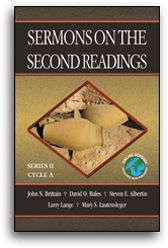SermonStudio
A Big Enough Reason
Sermon
Sermons On The Second Readings
Series II, Cycle A
Peter writes to Christian slaves. In the late first century AD, when the Christian church spread from Palestine into the larger Roman Empire, a greater and greater percentage of the church was slaves. In the ancient world slaves were any color. Masters thought up excuses why it was allowable to enslave another, but at least they didn't create the most laughable and tragic excuses, reasoning that it was okay to enslave a person of a different color.


